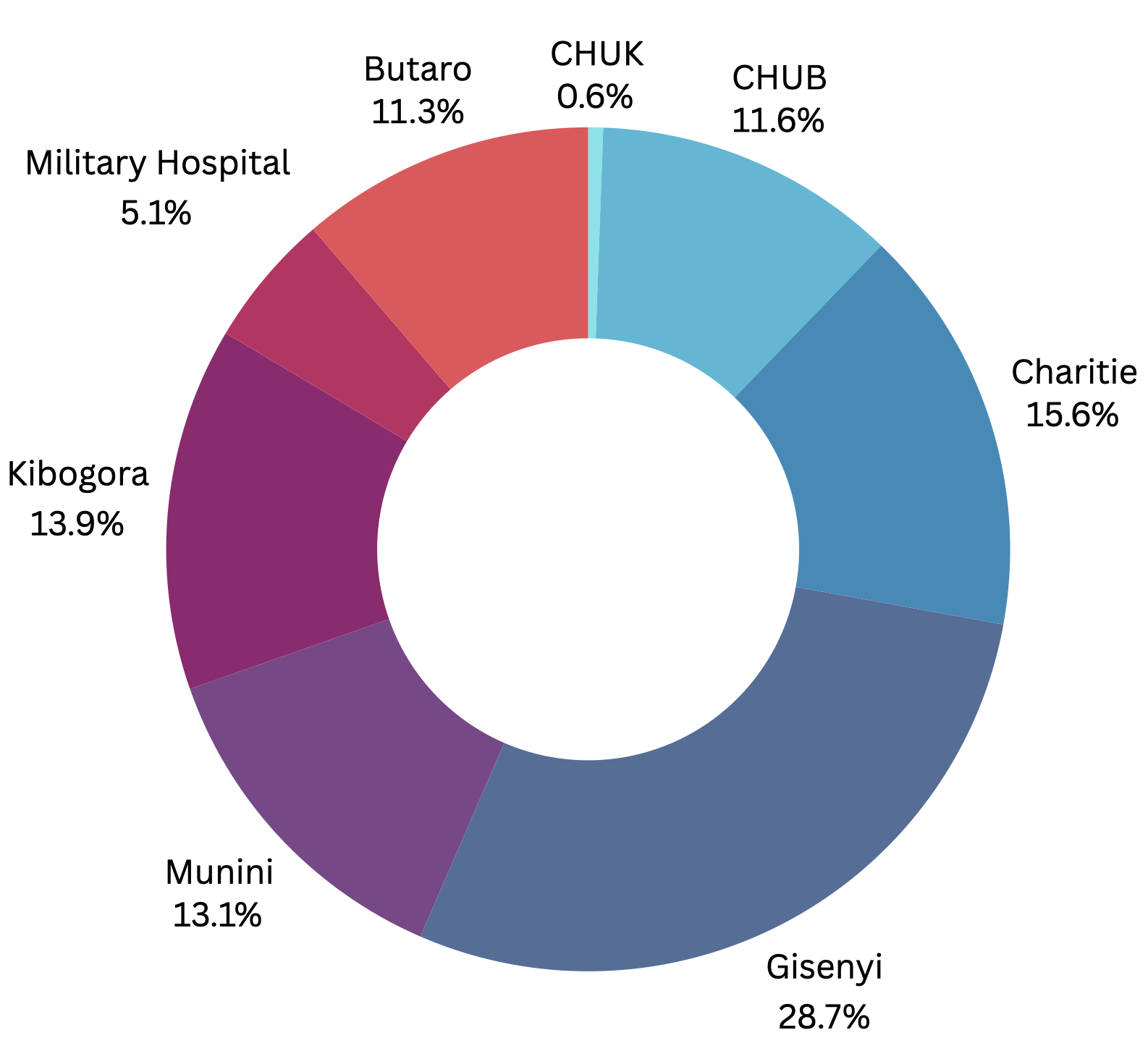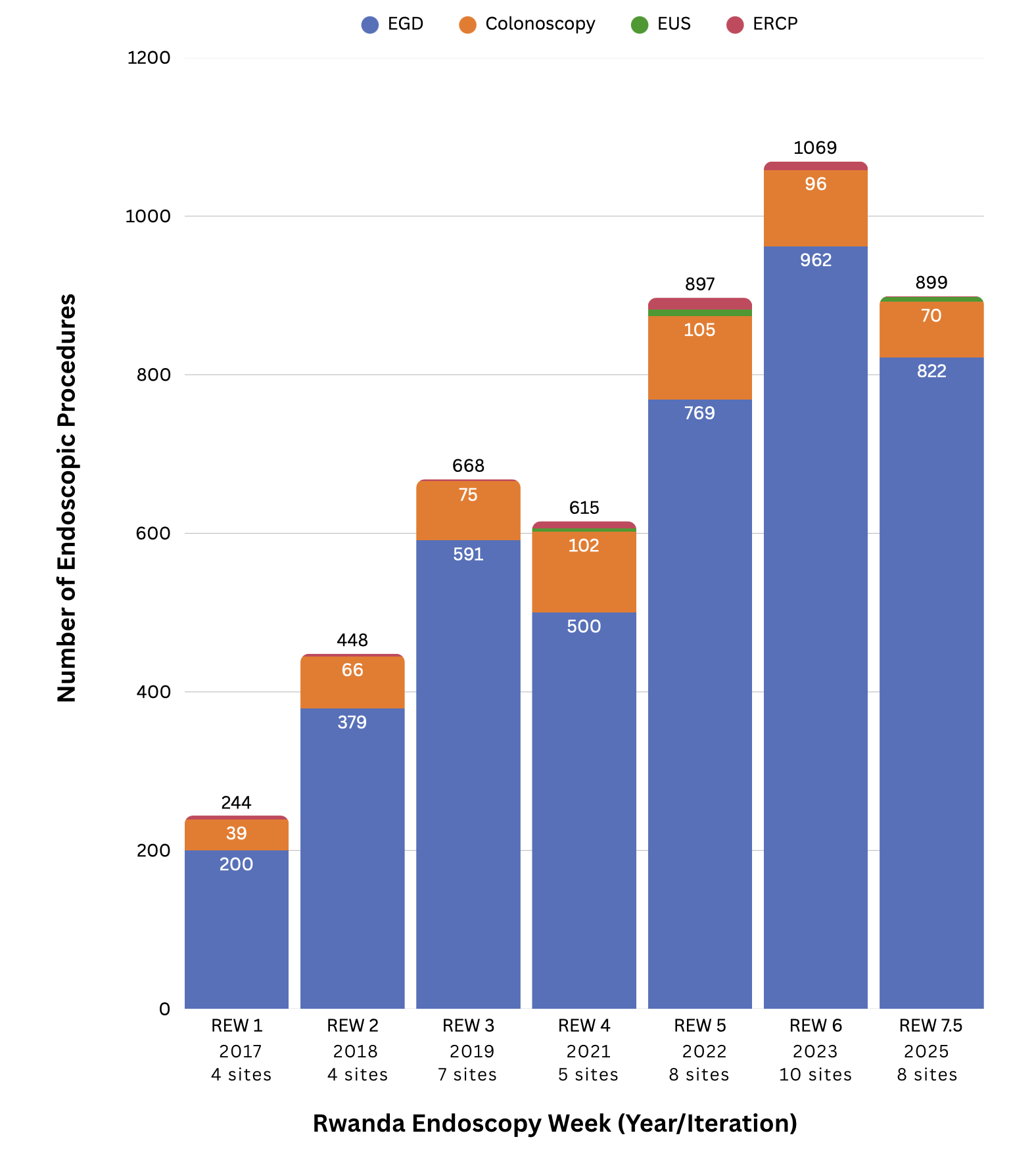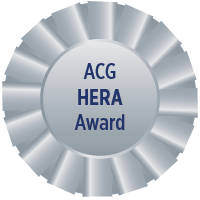Monday Poster Session
Category: General Endoscopy
P3002 - Rwanda Endoscopy Week 2025: Expanding Endoscopic Capacity and Sustaining GI Care -- Seven Years of Programmatic Impact
Monday, October 27, 2025
10:30 AM - 4:00 PM PDT
Location: Exhibit Hall
- ST
Sharon M. Thomson, MD (she/her/hers)
Dartmouth Hitchcock Medical Center
Lebanon, NH
Presenting Author(s)
Chioma Owo, MD1, Izere Josiane, MD2, Marie Solange Mukanumviye, MD3, Sharon M. Thomson, MD4, Dora C. Huang, MD5, Prosper Ingabire, MD, MMED6, Hanna Aberra, MD, PhD7, Shikama Félicien, MD8, Priya Varghese, MD9, Neil I. Sood, MD10, Rukaiya Bashir Hamidu, MD11, Madison C. Duclos, MPH4, Eric Rutaganda, MD12, Timothy B. Gardner, MD, MS4, Steven P. Bensen, MD4, Vincent Dusabejambo, MD2
1University of Texas Health San Antonio, San Antonio, TX; 2University Teaching Hospital of Kigali, Kigali, Kigali, Rwanda; 3University Teaching Hospital of Kigali (CHUK), Kigali City, Kigali, Rwanda; 4Dartmouth Hitchcock Medical Center, Lebanon, NH; 5Beth Israel Deaconess Medical Center, Boston, MA; 6Kibagabaga Level Two Teaching Hospital, Kigali, Kigali, Rwanda; 7King Faisal Hospital Rwanda, Kigali, Kigali, Rwanda; 8Butare University Teaching Hospital, Butare, Kigali, Rwanda; 9Jefferson Health, Philadelphia, PA; 10Saint Luke's University Hospital, Bethlehem, PA; 11University of Maryland Medical Center, Baltimore, MD; 12CHUK, Kigali, Kigali, Rwanda
Introduction: The 7th Rwanda Endoscopy Week (REW 7.5) was held from March 10–14, 2025, marking the first event following Rwanda's Marburg Virus Disease (MVD) outbreak in late 2024. Originally scheduled for November 2024, REW was postponed due to the outbreak. This year's program underscored the resilience of Rwanda’s health system and its sustained commitment to expanding gastroenterology services. We present an overview of clinical activity, procedural outcomes, and system-level trends observed during REW 7.5.
Methods: We prospectively collected data during REW 7.5 using a standardized survey tool. Data encompassed patient care, hands-on training, and academic workshops across eight hospitals. A total of 899 endoscopic procedures were recorded and analyzed. Collected variables included patient demographics, anesthesia use, procedural indications, endoscopic findings (esophagus, stomach, duodenum, colon), interventions performed, and quality metrics (cecal intubation, bowel preparation quality).
Results: A total of 899 procedures (mean age 45.6 years; 62.1% female) were performed across eight locations: 822 EGDs, 70 colonoscopies, 6 endoscopic ultrasounds, and 1 ERCP. Clinical sites included district, private, military, and tertiary hospitals, reflecting an intentional expansion of endoscopy access beyond traditional referral centers. Procedures were both diagnostic and therapeutic, with interventions including 45 biopsies, 13 dilations, 6 snare polypectomies, 4 variceal ligations, and others such as clip placement. Anesthesia was used in 40.4% of cases (42.9% of EGDs, 92.9% of colonoscopies), signaling growth in procedural tolerance and safety. No procedural complications or nosocomial infections were reported.
While REW 7.5 had fewer procedures than REW 6 (899 vs. 1,069), this reflected temporary service disruption due to MVD. Still, the successful deployment of a binational team across eight hospitals emphasized the durability of Rwanda’s endoscopy infrastructure. Since the inaugural REW in 2017, over 5,000 procedures have been performed.
Discussion: REW 7.5 demonstrated continued resilience, adaptability, and long-term vision of Rwanda Endoscopy Week. Despite logistical challenges, the program maintained its focus on high-quality care and training. This year’s findings underscore the need for improved triage protocols for dyspeptic patients and broader support for remote endoscopy access, anesthesia access, and GI fellowship sustainability to ensure long-term equity in procedural care delivery.

Figure: Figure 1: Distribution of Endoscopic Procedures by Hospital Site During REW 7.5
Endoscopic procedures (N = 899) were performed across eight hospitals during REW 7.5, with Gisenyi (28.7%), Charité (15.6%), Kibogora (13.9%), and Munini (13.1%) performing the most. The distribution reflects efforts to decentralize GI care and strengthen district and regional hospital capacity.

Figure: Figure 2: Comparative Volume and Intervention Trends Across REW Years
Procedural volume trends over seven years of Rwanda Endoscopy Week (2017-2025), demonstrating sustained growth and resilience despite public health disruptions.
Disclosures:
Chioma Owo indicated no relevant financial relationships.
Izere Josiane indicated no relevant financial relationships.
Marie Solange Mukanumviye indicated no relevant financial relationships.
Sharon Thomson indicated no relevant financial relationships.
Dora Huang indicated no relevant financial relationships.
Prosper Ingabire indicated no relevant financial relationships.
Hanna Aberra indicated no relevant financial relationships.
Shikama Félicien indicated no relevant financial relationships.
Priya Varghese indicated no relevant financial relationships.
Neil Sood indicated no relevant financial relationships.
Rukaiya Bashir Hamidu indicated no relevant financial relationships.
Madison Duclos indicated no relevant financial relationships.
Eric Rutaganda indicated no relevant financial relationships.
Timothy Gardner indicated no relevant financial relationships.
Steven Bensen indicated no relevant financial relationships.
Vincent Dusabejambo indicated no relevant financial relationships.
Chioma Owo, MD1, Izere Josiane, MD2, Marie Solange Mukanumviye, MD3, Sharon M. Thomson, MD4, Dora C. Huang, MD5, Prosper Ingabire, MD, MMED6, Hanna Aberra, MD, PhD7, Shikama Félicien, MD8, Priya Varghese, MD9, Neil I. Sood, MD10, Rukaiya Bashir Hamidu, MD11, Madison C. Duclos, MPH4, Eric Rutaganda, MD12, Timothy B. Gardner, MD, MS4, Steven P. Bensen, MD4, Vincent Dusabejambo, MD2. P3002 - Rwanda Endoscopy Week 2025: Expanding Endoscopic Capacity and Sustaining GI Care -- Seven Years of Programmatic Impact, ACG 2025 Annual Scientific Meeting Abstracts. Phoenix, AZ: American College of Gastroenterology.
1University of Texas Health San Antonio, San Antonio, TX; 2University Teaching Hospital of Kigali, Kigali, Kigali, Rwanda; 3University Teaching Hospital of Kigali (CHUK), Kigali City, Kigali, Rwanda; 4Dartmouth Hitchcock Medical Center, Lebanon, NH; 5Beth Israel Deaconess Medical Center, Boston, MA; 6Kibagabaga Level Two Teaching Hospital, Kigali, Kigali, Rwanda; 7King Faisal Hospital Rwanda, Kigali, Kigali, Rwanda; 8Butare University Teaching Hospital, Butare, Kigali, Rwanda; 9Jefferson Health, Philadelphia, PA; 10Saint Luke's University Hospital, Bethlehem, PA; 11University of Maryland Medical Center, Baltimore, MD; 12CHUK, Kigali, Kigali, Rwanda
Introduction: The 7th Rwanda Endoscopy Week (REW 7.5) was held from March 10–14, 2025, marking the first event following Rwanda's Marburg Virus Disease (MVD) outbreak in late 2024. Originally scheduled for November 2024, REW was postponed due to the outbreak. This year's program underscored the resilience of Rwanda’s health system and its sustained commitment to expanding gastroenterology services. We present an overview of clinical activity, procedural outcomes, and system-level trends observed during REW 7.5.
Methods: We prospectively collected data during REW 7.5 using a standardized survey tool. Data encompassed patient care, hands-on training, and academic workshops across eight hospitals. A total of 899 endoscopic procedures were recorded and analyzed. Collected variables included patient demographics, anesthesia use, procedural indications, endoscopic findings (esophagus, stomach, duodenum, colon), interventions performed, and quality metrics (cecal intubation, bowel preparation quality).
Results: A total of 899 procedures (mean age 45.6 years; 62.1% female) were performed across eight locations: 822 EGDs, 70 colonoscopies, 6 endoscopic ultrasounds, and 1 ERCP. Clinical sites included district, private, military, and tertiary hospitals, reflecting an intentional expansion of endoscopy access beyond traditional referral centers. Procedures were both diagnostic and therapeutic, with interventions including 45 biopsies, 13 dilations, 6 snare polypectomies, 4 variceal ligations, and others such as clip placement. Anesthesia was used in 40.4% of cases (42.9% of EGDs, 92.9% of colonoscopies), signaling growth in procedural tolerance and safety. No procedural complications or nosocomial infections were reported.
While REW 7.5 had fewer procedures than REW 6 (899 vs. 1,069), this reflected temporary service disruption due to MVD. Still, the successful deployment of a binational team across eight hospitals emphasized the durability of Rwanda’s endoscopy infrastructure. Since the inaugural REW in 2017, over 5,000 procedures have been performed.
Discussion: REW 7.5 demonstrated continued resilience, adaptability, and long-term vision of Rwanda Endoscopy Week. Despite logistical challenges, the program maintained its focus on high-quality care and training. This year’s findings underscore the need for improved triage protocols for dyspeptic patients and broader support for remote endoscopy access, anesthesia access, and GI fellowship sustainability to ensure long-term equity in procedural care delivery.

Figure: Figure 1: Distribution of Endoscopic Procedures by Hospital Site During REW 7.5
Endoscopic procedures (N = 899) were performed across eight hospitals during REW 7.5, with Gisenyi (28.7%), Charité (15.6%), Kibogora (13.9%), and Munini (13.1%) performing the most. The distribution reflects efforts to decentralize GI care and strengthen district and regional hospital capacity.

Figure: Figure 2: Comparative Volume and Intervention Trends Across REW Years
Procedural volume trends over seven years of Rwanda Endoscopy Week (2017-2025), demonstrating sustained growth and resilience despite public health disruptions.
Disclosures:
Chioma Owo indicated no relevant financial relationships.
Izere Josiane indicated no relevant financial relationships.
Marie Solange Mukanumviye indicated no relevant financial relationships.
Sharon Thomson indicated no relevant financial relationships.
Dora Huang indicated no relevant financial relationships.
Prosper Ingabire indicated no relevant financial relationships.
Hanna Aberra indicated no relevant financial relationships.
Shikama Félicien indicated no relevant financial relationships.
Priya Varghese indicated no relevant financial relationships.
Neil Sood indicated no relevant financial relationships.
Rukaiya Bashir Hamidu indicated no relevant financial relationships.
Madison Duclos indicated no relevant financial relationships.
Eric Rutaganda indicated no relevant financial relationships.
Timothy Gardner indicated no relevant financial relationships.
Steven Bensen indicated no relevant financial relationships.
Vincent Dusabejambo indicated no relevant financial relationships.
Chioma Owo, MD1, Izere Josiane, MD2, Marie Solange Mukanumviye, MD3, Sharon M. Thomson, MD4, Dora C. Huang, MD5, Prosper Ingabire, MD, MMED6, Hanna Aberra, MD, PhD7, Shikama Félicien, MD8, Priya Varghese, MD9, Neil I. Sood, MD10, Rukaiya Bashir Hamidu, MD11, Madison C. Duclos, MPH4, Eric Rutaganda, MD12, Timothy B. Gardner, MD, MS4, Steven P. Bensen, MD4, Vincent Dusabejambo, MD2. P3002 - Rwanda Endoscopy Week 2025: Expanding Endoscopic Capacity and Sustaining GI Care -- Seven Years of Programmatic Impact, ACG 2025 Annual Scientific Meeting Abstracts. Phoenix, AZ: American College of Gastroenterology.

